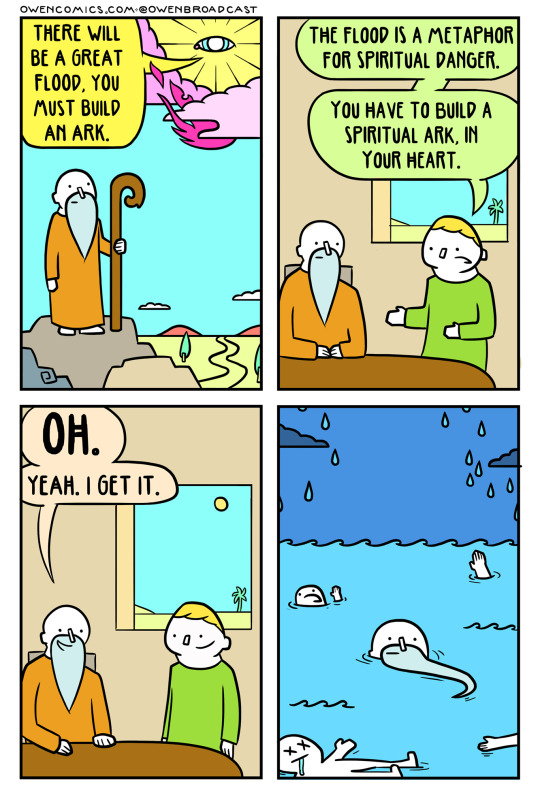#Hermeneutic
Photo
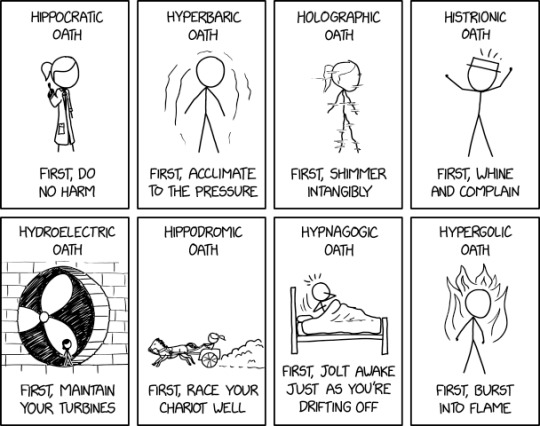
Professional Oaths
Subtext: "Interpretations of the Hermeneutic Oath differ."
0 notes
Text
The Postmodern Attack on Biblical Ethics
It is not possible to live the faithful Christian life while compromising with the Postmodern ideology. Postmodernism is explicitly opposed the biblical ethics.
https://rumble.com/v3oclxg-the-postmodern-attack-on-biblical-ethics.html
View On WordPress
#Authority#Bible#Christian Living#Culture#Denominationalism#Doctrine#Evangelism#False Doctrine#Gospel#Hermeneutic#Knowledge#The Bible
0 notes
Text
Slutty couple begins with kissing then gal gets tits sucked
Tight butt of a pretty shemale gets pressed with biggest dong
Asian babe with massive hooters enjoys raucous fucking
borracha orinando buena la puta
san cristobal, chiapas
sexy gujarati fildwaker
This milf boss hires my GF for my dick
Outdoor pissing and masturbation with tattooed thug with glasses
Hairy tattooed wife moans as she is fucked in homemade video
Best indian boobs press video
#superelementary#laboristic#projectedly#breadstuffs#retentor#mealtime#crimmy#columbeia#whsle.#SCOT#secant#mollescent#low-ceiled#precoded#hermeneutic#caufle#gynaecomastia#black-robed#Farley#anda-assu
0 notes
Text
Hi, I'm deconstructing-christian-girl! I am a 37 year old religious homeschooling survivor, cult escapee, and theologian. My principle field of study growing up was theology, taught by my father, a pastor and theologian, to be a pastor and theologian. I've written three now out of print works on Christian eschatology, ethics, and love.
My deconstruction process was long and messy. It started when I was 12 when my pet died and I prayed and begged God not to take him and having only the deafening silence of a closed heaven. It started in my teens when I began to develop a trauma response to dominionist theology and I started yearning for a better Way. It started in college, when I met the people I had hated from a distance up close and found I was wrong about them. It started when I left home, joined a patriarchal cult, got everything I had been told to want, and it was utter misery. It started when I moved in down the street from a real seminary library and started going there and reading every day after work. It started when I discovered I had serious, incurable diseases that rendered me disabled. It started when 81% of white evangelicals voted for Trump, and then 83% did it again. That, to me, was the genuine last straw. Those values are so antithetical to the basic, core principles of Jesus Christ that they have become a false Idol, Anti-Christ.
I walked away. Became an atheist. But as the world falls apart and twilight gathers over the American age, I find myself gravitating back toward the language of faith and love of the bible, especially that of the Prophets and Jesus, as a way to express deep fears and deep hope in dark times.
So I have started reading the bible again. I've started reading theology again. I started practicing Christian meditation, called Contemplation. It opened something inside me, and helped my trauma start to heal. I forgave my parents, something I never thought I'd be able to say without lying. I touched something transformative, and the only metaphors that seem fitting are those of faith.
So I began this blog to help work through some of these things. As I am working in theology again, I'm going to post a lot about it, dissecting passages and interpretations, exploring the original languages, and pointing out each and every time conservatives make bogus claims. I'll also be working on a larger project of writing a systematic theology built around an interpretive principle of love.
Plus I'll share from my own journey and my own nerdy life.
#exvangelical#deconstruction#deconstructing#christian#theology#hermeneutic#hermeneutic of love#faith#hope#love#Jesus
1 note
·
View note
Text
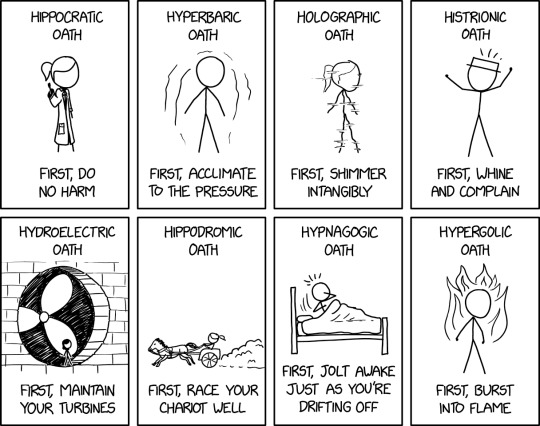
Interpretations of the Hermeneutic Oath differ.
Professional Oaths [Explained]
Transcript Under the Cut
[8 Panels in a grid.]
Hippocratic Oath
[Ponytail in a doctor's coat with her arm raised in pledge.]
First, do no harm
Hyperbaric Oath
[Cueball shaking.]
First, acclimate to the pressure
Holographic Oath
[A hologram of Ponytail fitzing in parts.]
First, shimmer intangibly
Histrionic Oath
[White Hat yelling, fists upraised.]
First, whine and complain
Hydroelectric Oath
[Megan sat in the cut-out wall for a giant turbine.]
First, maintain your turbines
Hippodromic Oath
[Ponytail in a chariot pulled by a horse.]
First, race your chariot well
Hypnagogic Oath
[Cueball, half-risen from bed in shock.]
First, jolt awake just as you're drifting off
Hypergolic Oath
[Cueball on fire.]
First, burst into flame
#xkcd#professional oaths#xkcd 2843#webcomics#hippocratic oath#doctors#hyperbaric#holograms#histrionics#hydroelectric#turbines#chariots#hippodrome#hypnagogy#hypergolic propellant#hermeneutics
663 notes
·
View notes
Text
The Curse finale interpretation
Ash's ascent/death, parallels to pregnancy, and "lived experience" in The Curse
There was a parallel between the way nobody believed or understood Asher when he was stuck in the tree to the way that pregnant people are treated while they are in labor (or even how women are treated in medical settings in general)
Ash's ascent/death
Nobody would believe Ash (besides Whitney who witnessed him floating inside the house and Moses who saw Ash float up into the tree) that he couldn't come down. Everyone who sees him projects their own interpretation of Ash's experience and intentions.
Dougie thinks Ash is running from his responsibilities because Dougie's dad did the same, and (from Dougie's POV), some men panic or even run away from their responsibilities once their partner is in labor or gives birth.
The neighbors from the community think that Ash and Dougie must be filming something because that's is their experience with these outsiders; they are TV people and act strangely, which can be explained by assuming that any weird behavior is a part of making a TV show. This explanation is also the best that they have for how Ash could possibly defy physical law (because it really isn't reasonable to assume that he just is breaking physical law in some way).
Ash repeatedly tells them that he will fly up. He tries his best to explain what he is going through, and he isn't doing the best job, probably because he's extremely afraid that he might die. I repeatedly tells Dougie and the first responders what he needs from them, and nobody listens. They think that Ash is delusional and that everyone else has a better understanding of the situation and therefore know what to do.
Connection to pregnancy
I think some of Ash's experience can be seen as analogous to what pregnant women (and women in medical settings in general) experience. Historically, doctors have been male, and they obviously have never been pregnant or gone into labor, and studies show that even women healthcare providers dismiss women and minorities in medical settings (it has to do with socialized biases in everyone, which I will come back to).
These professionals often dismiss a pregnant person's self-report of needing help, and a CDC report shows that 1 in 5 women report medical mistreatment while giving birth:
Approximately one in five (20.4%) respondents reported experiencing at least one type of mistreatment. The most commonly reported experiences of mistreatment were being ignored by health care providers, having requests for help refused, or not responded to (9.7%); being shouted at or scolded by health care providers (6.7%); having their physical privacy violated (5.1%); and being threatened with withholding of treatment or being forced to accept treatment they did not want (4.6%).
The same report found that the poorer the woman or more marginalized her background, the more risk of facing mistreatment:
Overall, 28.9% of respondents reported experiencing at least one form of discrimination during maternity care (Table 3), with highest prevalences reported by Black (40.1%), multiracial (39.4%), and Hispanic (36.6%) respondents. Overall, the most commonly reported reasons for discrimination were age (10.1%), weight (9.7%), and income (6.5%); reasons varied by race and ethnicity.
Initially Whitney planned to go to what was implied to be a better hospital. It feels like the show maybe wanted the viewer to expect that Whitney would die due to being at a "poor" hospital (and maybe she did; the finale went no full magical realism, imo). Benny and Nathan probably expected that viewers would immediately think or even assume that this would happen (drawing from our own biases, even if they are informed by statistics), which makes me think that Ash's experience is analogous to pregnant peoples' medical mistreatment.
In these medical settings, doctors frequently ignore a pregnant person's self-reports or requests for help, and instead, the doctors and medical staff (regardless of gender) tend to think that they know better or that the pregnant person is delusional/hormonal/emotional/etc. They dismiss their lived experience. Doctors have historically been male, so they have NO experience being pregnant, but they think they know better than the pregnant person, and even women who have been pregnant cannot speak for every woman. It is not rational to take your own experiences and extrapolate them to everyone else (which has been a common theme in the show: making assumptions based off of limited experience or socialized biases).
Like pregnant people facing medical mistreatment, Ash was ignored by health care providers Dougie and First Responders, had requests for help refused, or not responded to; he was shouted at or scolded by health care providers Dougie for running from responsibilities of becoming a father; and had treatment withheld (the anchored net that he repeatedly begged for) and was forced to accept treatment they did not want (tree branch cut off, sending him to his death).
Lived experience, hermeneutical gaps, and epistemic injustice
OKAY. So this comes back to (what I have taken to be) the overall recurrent theme of The Curse: lived experience, hermeneutical gaps/injustice, and testimonial injustice (which are forms of epistemic injustice, for anyone who is interested in learning more about this).
Hermeneutical gaps occur when a person or group lacks the concepts or terminology to describe their experience. Such gaps lead to hermeneutical injustice; Miranda Fricker describes hermeneutical injustice as occurring
when a gap in collective interpretive resources puts someone at an unfair disadvantage when it comes to making sense of their social experiences. An example of the first might be that the police do not believe you because you are black; an example of the second might be that you suffer sexual harassment in a culture that still lacks that critical concept . . . hermeneutical injustice is caused by structural prejudice in the economy of collective hermeneutical resources.
Before the term 'sexual harassment' came to be, people impacted by such harassment didn't have the concepts or terminology to be able to describe their experience or what they were going through; they were often dismissed as just being flirted with or they didn't even discuss their experience because even though the felt like something was wrong, they didn't have the concepts to articulate their experience, particularly to groups who do not have such experiences.
Here, Fricker describes hermeneutical injustice as:
. . . someone has a significant area of their social experience obscured from understanding owing to prejudicial flaws in shared resources for social interpretation . . . The wrong is analysed in terms of a situated hermeneutical inequality: the prejudicial flaws in shared interpretive resources prevent the subject from making sense of an experience which it is strongly in her interests to render intelligible.
So hermeneutical gaps (lack of conceptual resources [words or formed concepts] to describe experience) lead to hermeneutical injustice (where a person's experience is misinterpreted in a way that leads to harm or testimonial injustice).
Testimonial injustice occurs when one party (person or group) dismisses the credibility of another group (basically treating the marginalized person as though they are not a true knower).
An example might be Fernando trying to be heard about his knowledge of the community violence. Whitney dismisses him, thinking that she knows more about systemic issues. Ash takes advantage of this kind of injustice when he tries to cover his lie that Abshir, Nala, and Hani live in transitional housing once they bought the property they live in. Whitney called out the inconsistency, and Ash decided to exploit the lack of credibility marginalized people are usually extended. He says something like "honestly I don't know with them they say one thing then another," implying that they are dishonest.
Connecting Ash's ascent/death and medical mistreatment of pregnant people with overall themes in The Curse
ANYWAY. Pregnant people in labor go through a unique experience, and sometimes they lack the concepts necessary to explain their experience in a way that medical professionals will "understand" or take seriously (hermeneutical gap leading to hermeneutical injustice). Further, medical professionals dismiss a pregnant person's testimony and treat them like they are not credible while the medical professionals work from their own assumptions or formal medical knowledge (testimonial injustice).
Asher does not have the concepts to describe what he's going through. Nobody has experienced what he experienced, and the experience is new to him, so he doesn't know how to convey what he experiences in a way that Dougie and First Responders will understand. Further, Dougie and the First Responders dismiss Ash's testimony and treats him like he's not credible while Dougie and the First Responders work from their own assumptions or ascriptions of Ash's intentions.
Throughout the show, our main characters have made assumptions about poor people, natives, and their own employees. Many of these assumptions arise out of dismissing or discrediting the experiences of others in favor of their own interpretation of events or others' intentions. Whitney (and Ash) thinks she knows what's best for Las Espanola, even though she lacks the lived experience or even the proper educational experience to understand the complex nature of amending systemic injustice. She is like the medical professionals and First Responders who do not listen to the lived experiences (self-reports) of what people want or need.
This behavior necessarily implies that the people she's helping don't know what's best for themselves, which implies that Whitney has some kind of expertise that qualifies her to intervene on their behalf. She actually doesn't; she has no qualification other than she happens to have rich parents, which doesn't really qualify a person for any kind of job, especially one as complicated as amending economic or social injustice.
I didn't expect there to be growth on behalf of the characters (largely because people have pointed out that Safdie brother projects rarely involve any kind of meaningful growth or resolution; they have bleak outcomes), but in the finale, I thought that Whitney (and Ash) had grown. She expresses jealousy and bitterness that Cara was receiving national attention for leaving the art scene while her and Ash's show wasn't even aired; it ended up being direct to app content. She uncharitably criticizes Cara for disliking exploitive collectors, and Whit says that she thinks that Cara quit because no one bought her work. Ash jokes that maybe if Whit quits her project to work in a massage parlor, maybe people will write about her too. Whit bitterly jokes back that she would need some kind of cultural sob story like saying she was making a statement on the Holocaust. Ash says he knows that she's making joke that selling her art retraumatized her but goes on to point out that native people have gone through a lot, which he says that he fully understands where Cara is coming from and that people process tragedy in their own way (discussing Mel Brooks), and Whitney finally concedes that she probably shouldn't be talking the way she is and that she doesn't have that lived experience. He assures her that he considers her Jewish (and that she can make such jokes), but I think the takeaway is that—on some level—Whitney has gained some self-awareness and realizes that her experiences shouldn't inform the way she interprets other peoples' choices and intentions.
The concepts I discussed here might also be connected to the Dunning-Kruger Effect, which is the phenomenon that people (at any level of intelligence or education) learn something and think that they have a better understanding of what is going on than they actually do. When people (like Whitney) decide to act on such false assumptions of self-evaluation, they are likely to make mistakes or perpetuate injustice.
tldr; the real curse (imo) is the insidious implicit biases that are socialized into us and lead us to making assumptions about others' experiences and intentions. These assumptions ultimately create barriers that limit social understanding and social progress. If we all take a moment to examine why we reasoned as we do or where we get our ideas about people who don't share our ethnic, economic, gendered, religious, etc. background, we might find that we are missing the necessary lived experience (a hermeneutical gap) to understand where they might be coming from. Instead of assuming intent or competency or dismissing or being suspicious, we should all charitably interpret others to try to assume the best in and most of other people. It is what we would want others to do for us. Performing this kind of empathy will ultimately lead to developing the necessary empathy to overcome such biases by habit alone, which will create a more compassionate, empathetic, and understanding world, while also deepening and enriching our own lives and the lives of others by celebrating our plurality.
When we allow certain ideas into our head, they become very real to us, and when we act on those ideas without examining them carefully, those false beliefs can cause real harm.
#the curse#nathan fielder#benny safdie#emma stone#a24#showtime#epistemic injustice#hermeneutical gap#hermeneutical injustice#lived experience#spoilers#the curse explained#the curse finale explained#green queen#the curse s1e10#implicit bias#cognitive bias#dunning kruger
72 notes
·
View notes
Text
headcanons do not have to have any canonical basis i don't know why i continue to see people be like "actually such and such character is [blank]-coded and here's why" when it's just blatantly a headcanon. i headcanon characters as trans and so do a million people, that doesn't mean they're trans coded. they aren't! like rarely are they actually coded as such! and that's fine! your headcanons do not have to have any place in the canonical text. they are a form of interpretation.
to me it feels like people have completely lost the thread of what a headcanon should be (ideas about characters/narratives that may pull from more orthodox interpretation but can sometimes just be "i like snakes and want this character to be a snake hybrid") and instead now have decided that headcanons must have basis in the text and must be provable and convincing to other fans. if someone doesn't like your snake hybrid propaganda ("think about how cool heat pits would be!!") that's fine. people have different wants out of headcanons. but the notion that yours MUST be provable and must be THE correct interpretation of the text is ridiculous.
it also feels connected to the level of fanservice people expect from media-- popular headcanons are expected to be acknowledged by creators and sometimes incorporated themselves, so proving yours is the most feasible becomes incentivized so that it gets canonized. again, not how interpretation ought to work. we're not doing fandom apologetics here. someone else's deer hybrid headcanon is not going to ruin your chances of snake hybrid billy becoming part of your favorite show.
headcanons are supposed to be fun and significant to you personally, not universally accepted ideas about the characters.
#bell.txt#fandom hermeneutics#also people getting coding confused with 'i can see a character being this' is such a huge problem#that was what made me think about all this but properly explaining to people that they dont know what coding means. sounds hard#snake hybrids is a silly example but i didn't want to shit on anyones actual resonant headcanons sigh
124 notes
·
View notes
Text
The bizarre double bind of conservative "Great Books" programs is that they acknowledge that these books are important because they've been read continuously throughout history since the time they were written, but they don't think you should read what all other people throughout history thought of them unless those people also happen to have written "Great Books" themselves.
40 notes
·
View notes
Text
We don't think that people understand that not having the words to describe their own experiences actually IS its own special kind of hell, and also a literal form of oppression.
It's called hermeneutical injustice, so like YEAH — even if endogenics' concerns was the ability to have the word endogenic that is still very very bad and you are still a raging bigot, asshole.

#not inspired by anything in particular. just...angry about how people like to treat endogenics im general.#we also think hermeneutical injustice not being treated as a “serious issue” is part of like.#why people lose their shit over the word transandromisia/transandrophobia.#or hate xenogender people.#etc.
37 notes
·
View notes
Text
Claudia, Viren & The Very Real Parent-Child Dynamics of The Dragon Prince
Sometimes I wonder if I come across like I try to defend Claudia too much. That's not my intent at all. I just think she deserves more and better critique.
The Point I guess
Personally, I really connect with Claudia's brand of messy, unflattering and even pathetic rage and grief much more than the dignified and mature ways Callum and Ezran handle things (More on that later). Maybe this sounds unflattering but Claudia being also kind of an asshole really speaks to me. Like that's the kind of teenage girl I'm the most familiar with and we don't have enough media that has nuanced takes on this sort of troubled character. Exploring negative or even anti-social traits and impulses in fiction, especially in women, is kind of undervalued in my opinion. Those are part of humanity and therefore part of us and this impulse to completely reject them doesn't benefit anyone really.
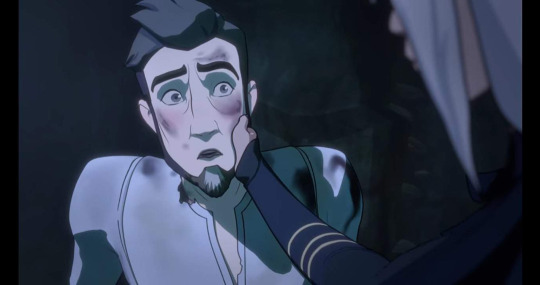
Finally, some wholesome father-daughter relationship rep in media!
My way to view fantasy media is about how it can artistically portray something true to real life. That's why I'm the most invested in this kind of reading of the text. Fantasy media is often dismissed as mere escapism even by the fantasy fans themselves (*side eyes the dude bro Witcher fandom*) which ignores the emotional depths it can reach by approaching difficult subject matter more metaphorically.
Inject Viren & Claudia's Father-Daughter Dynamic Straight into My Veins
There is something viscerally real about Claudia and Viren's relationship. I've seen this kind of father-daughter dynamic play out in real life many times where the child gives and gives and gives yet the parent takes it all for granted until it's too late and the parent-child relationship is just a mangled corpse of its former self, way too damaged to ever be truly repaired.
Like if you've had a difficult relationship with your parents it can feel similar to how s4-5 Claudia struggles to keep Viren alive while Viren hesitates. The child is the one who tries to fix things in the relationship while the parent is in denial or completely oblivious. Viren doesn't really try to connect with Claudia further in s4-5. It almost seems like he's completely emotionally unprepared to have that conversation and oh boy if you know any boomer parents that's pretty damn realistic. He just sort of gives up and acts completely passive because he's so out of touch with his emotions.
There is also this aspect of your parent aging and then one day you realise that you, the child, are the one who has more power in the relationship. It's a universal experience. These are just some of the ways I can see Viren and Claudia's relationship in seasons 4 and 5 metaphorically portray real life parent-child dynamics. There is a lot of emotional truth to how TDP approaches these relationships even when the story itself is an over the top fantasy romp.
How much Viren relies on Claudia is revealed little by little: She got the unicorn horn for the spell that killed Avizandum, she got the dragon horn that helped them cross the lava to Xadia in s3. It's set up really subtly how there is almost this parentification of Claudia like she's the one who took her mother's place as the emotional center and caregiver of the family after Viren and Lissa divorced. It's a lot of pressure to put one a child to say the least. This extends to Soren and how he is treated as the scapegoat of the family when Claudia is the Golden Child. This sort of treatment of Claudia and Soren by Viren is probably the most common analysis of their family dynamic as far as I can tell.
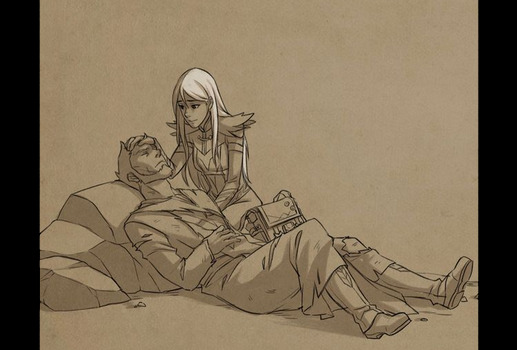
You ever heard of the thing called "eldest daughter syndrome"?
Eventually Claudia's most admirable and positive traits get corrupted (insert here an analysis of the corruptive nature of the dark magic as a plot device). It's like this perversion of feminine nurturing instinct society values and enforces in girls. Claudia's love is not domesticated but something that's so all consuming it destroys everything in its way. In s 4 she insists Viren has to live. She does everything in her power to keep her family together even against the wishes of her loved ones; first it was healing Soren in and then it was bringing Viren back to life in s3. Claudia has fully internalised her role as the caregiver to the point of self-imposed victimhood.
All The Characters Have a Part to Play
Since TDP is meant for an all-age audience (And later for teens and up since they hiked up the age rating) all the younger characters Callum, Ezran, Rayla, Claudia and Soren collectively represent the kind of different and difficult feelings parental abandonment and neglect can cause. A real person most likely feels all of these emotions at some point of their life but in fiction they need to be spread out among different characters or the story wouldn't work as, well, a story.
"she was a mage girl committing warcrimes, he was an elf boy vibing in the woods, can I make it anymore obvious"
I'd gladly read some more critical takes on Claudia's character. There is something very interesting there about Claudia and Terry's relationship for example. Terry is clearly very enamored with Claudia whom he perceives as someone very vulnerable and in need of help. Terry isn't wrong exactly but it does get problematic when he goes to great lengths to protect Claudia to the detriment of his own wellbeing. While TDP itself doesn't draw attention to it there are also the racial and gendered elements, both implicit and explicit, because of Claudia's fantasy racism and because of Terry being a non-white trans boy character as well. Claudia is the most powerful dark mage in Xadia when Terry is just a normal guy. Given the context of the show there is a power imbalance there.
tHÖ END
Why I'm laying this all out is that I think the Internet would be a better place if people didn't try to constantly find an objective "right" way to view a piece of media but instead were somewhat transparent about what they personally got out of it. I think this Viravos meta is the most popular thing I've written so far and I tried to explain my approach in detail because I don't want people to go "look this person says Viravos is canon!". Jokes are fine of course but taking it too objectively ignores the fact that analysing subtext is valuable on its own.
Idk how to end this. Here, have this meme.
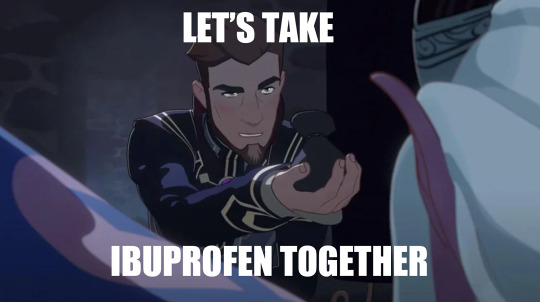
#help! I've gotten stuck in the hermeneutic circle and can't get out!#Viren & Claudia have the most interesting relationship in this show and it just keeps getting better and better#I think this is literally all that I've got to say about Claudia so far#the dragon prince meta#tdp meta#sarasade text
36 notes
·
View notes
Text
Bible Q-n-A #263: The Prohibitive Authority of Biblical Silence
Bible Q-n-A #263: The Prohibitive Authority of Biblical Silence
A social media post simply stating: “Bible silence does not permit, it prohibits,” has received over 250 comments and over 100 shares.
<iframe src="https://www.facebook.com/plugins/post.php?href=https%3A%2F%2Fwww.facebook.com%2FPreacherNorm%2Fposts%2F10223793795570386&show_text=true&width=500" width="500" height="474" style="border:none;overflow:hidden" scrolling="no" frameborder="0"…

View On WordPress
0 notes
Text
Gibson Girl, Rust Cohle (ii)
🥃: HD link, (i)
#theres a part 1 too babygirls i didnt just start this in the middle of the synth drop like a maniac#& full HD link in source#let's be youtube mutuals <3#🧃#true detective#rust cohle#marty hart#maggie hart#truedetectiveedit#true detective s1#idk what the hermeneutics will be on this video but i need everyone to know the authorial intent is that he fucked everyone in here#every single person with screentime#n he did it nasty ! thanks#the consequences of his actions... the ramificussy......#my boy took a speedball and said yk what you can't have a trackable body count if you shit where you eat and you fuck what you kill#in that order. or. is it#🤷♀️
23 notes
·
View notes
Text
frickin shite that was the worst small group I've ever been to in my life
#the eisegesis made me want to rattle out of my bones in frustration#got corrected for trying to cross-reference because ''we only stick to our one passage'' and nearly fucking cried about it#I PHYSICALLY CANNOT NOT CROSS-REFERENCE SCRIPTURE#not only is it a shitty hermeneutical process but it's also just Not How My Brain Works!!#y'all have seen me crossreference on this blog it isn't just the Bible! I can't Not crossreference things to save my life#and I basically got (admittedly she was trying to be kind about it) corrected in front of the entire group of 20somethings#and the couple that leads it are so PARTICULAR and nitpicky and it has to be done their way or you're gonna get corrected#my first introduction to her was her coming up to me while I was working the sound booth and telling me about something#wrong with my production setup that I KNEW ABOUT and WAS AND STILL AM NOT ABLE TO CHANGE#(our camera for livestreams doesn't have a high enough mount and I don't have space to extend it higher so we catch the tops#of people's heads in the camera shot)#and the girl I went bc I want to get to know her better WASNT EVEN THERE#I spent the entire time trying not to cry or look at anyone#I need to find a different small group... sorry all the kids my age were nice but I can't handle the structure or leaders#Lu rambles#adulthood woes
29 notes
·
View notes
Text
Proust, Joyce, Faulkner, Rilke, Lawrence, Gide…one could go on citing author after author; the list is endless of those around whom thick encrustations of interpretation have taken hold. But it should be noted that interpretation is not simply the compliment that mediocrity pays to genius. It is, indeed, the modern way of understanding something, and is applied to works of every quality. Thus, in the notes that Elia Kazan published on his production of A Streetcar Named Desire, it becomes clear that, in order to direct the play, Kazan had to discover that Stanley Kowalski represented the sensual and vengeful barbarism that was engulfing our culture, while Blanche Du Bois was Western civilization, poetry, delicate apparel, dim lighting, refined feelings and all, though a little the worse for wear to be sure. Tennessee Williams’ forceful psychological melodrama now became intelligible: it was about something, about the decline of Western civilization. Apparently, were it to go on being a play about a handsome brute named Stanley Kowalski and a faded mangy belle named Blanche Du Bois, it would not be manageable.
— Susan Sontag, from "Against Interpretation"
#susan sontag#sontag#lit#literature#against interpretation#proust#joyce#faulkner#rilke#lawrence#gide#hermeneutics#art#a streetcar named desire#elia kazan
31 notes
·
View notes
